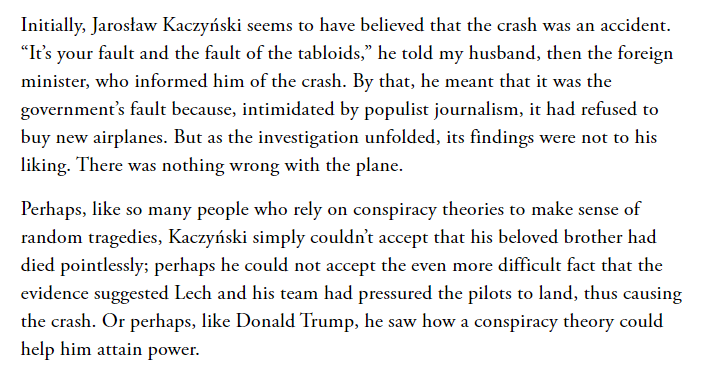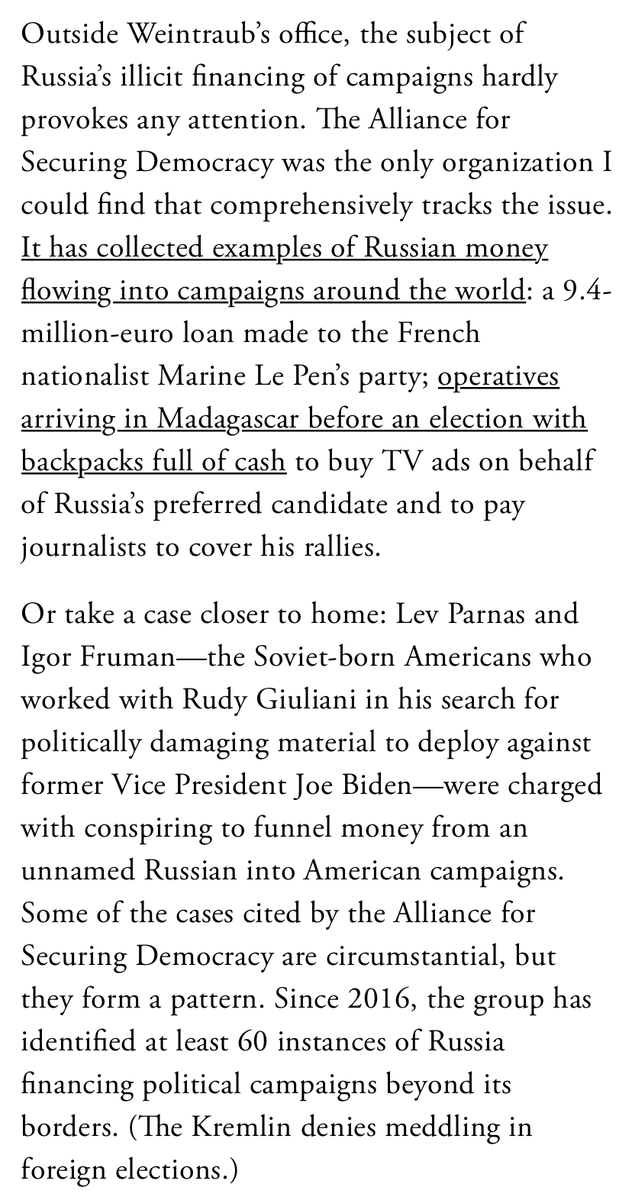
I see lots of reassuring advice to ignore Trump's lies about the election because he'll be gone in 71 days.
Conspiracy theories about a 2010 plane crash that killed a Polish president offer a darker warning: A big lie about a president's fall can permanently contort democracy.🧵
Conspiracy theories about a 2010 plane crash that killed a Polish president offer a darker warning: A big lie about a president's fall can permanently contort democracy.🧵
In April 2010, Polish President Lech Kaczyński died when the airplane carrying him went down near the Russian city of Smolensk in what turned out to be a failed attempt to save time by landing on a foggy airstrip in a dark forest. 

Initially, Lech Kaczyński’s twin brother, Jarosław, seemed to accept that the crash was an accident caused by a faulty old airplane. But after investigations showed the plane was fine, Jarosław turned to baseless conspiracies about sinister plotting by foreign & domestic enemies. 

Jarosław Kaczyński rode the conspiracy theory back to a position of power as a language to mobilize his followers and convince them to distrust the government and media.
In 2016, @anneapplebaum thoughtfully drew the parallel to how Trump used birtherism and the invented threat of immigrant crime to stoke the passions of his support base and become president. washingtonpost.com/opinions/globa…
Following Trump’s defeat in the 2020 election, his next act seems to add the presidential downfall of Lech to the conspiracy-laden demagoguery of Jarosław. That is, Trump is now poised to offer his followers the mythical embodiment of both Kaczyński brothers: martyr and savior.
By picking up support from Republican politicians & official communications from the Justice Dept., Trump is repeating what Jarosław Kaczyński did via military and police questioning after returning to power in 2015: institutionalize the lie w/ official innuendo, even w/o proof.
As @anneapplebaum warned in 2018, adherence to the lie at the heart of Polish politics gives the far right a basis to evaluate blind loyalty & tolerate broken promises, illegal behavior, & other offenses committed while defending ideology or pursuing power.theatlantic.com/magazine/archi…
It’s easy to imagine the same thing happening here in the years ahead, as Trump's base remains convinced they were cheated in 2020, and thus they become even more disposed to condone actual cheating in future elections, disinformation, partisan warfare, or even violence.
Beyond the lasting damage that would inflict on American democracy, do Republican leaders want spend possibly decades having to profess belief in (or at least openness to) this lie as a qualification for winning any primary election or appointment to Republican administrations?
Tough in the short term but redounding to all our benefit over time, the solution is as simple as the lie itself: institutionalize the truth. Nip it in the bud before the current suspicion among 70% of Republicans solidifies into an unassailable mythology. politico.com/news/2020/11/0…
The pivotal moment for loud and clear truth will come as soon as the recounts and legal processes end. All Republican leaders must tell Americans that the election was free and fair. They must also urge Trump to let it go the way he did birtherism in 2016. nbcnews.com/politics/2016-…
We have much to be grateful for over the past week, starting with a free and fair election and robust rule of law. The lies about the election too shall pass, but how quickly and how much lasting damage they inflict are in the hands of Republican leaders in the weeks ahead. 🔚
• • •
Missing some Tweet in this thread? You can try to
force a refresh








